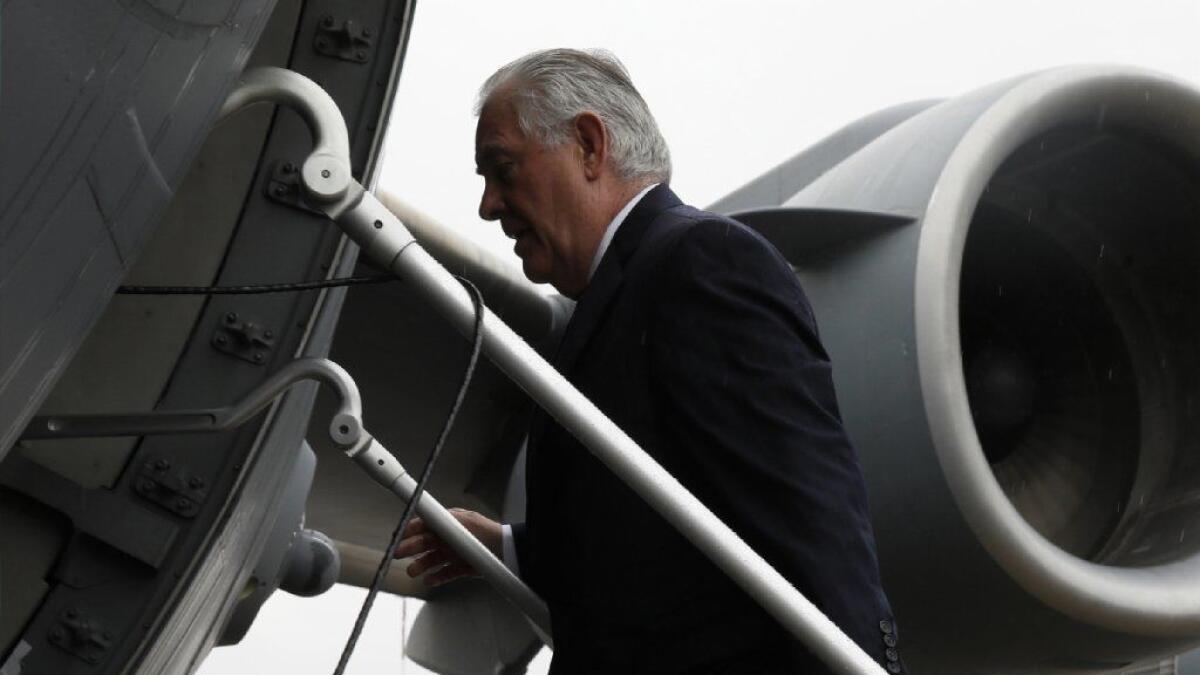Editorial: Mission impossible: Running stable foreign policy for an unstable president

Rex Tillerson was the wrong person to run the U.S. State Department, and he has done deep damage to the organization â most notably by proposing a controversial restructuring plan that would have shrunk the department, triggering the resignations of more than half the senior career diplomats, and failing to fill top vacancies (the White House shares much of that blame). But given Tillersonâs role as one of the few sane heads in the upper echelon of the Trump administration, it doesnât bode well for the country that the president canned him Tuesday morning in favor of Iran hawk and CIA chief Mike Pompeo.
A president, obviously, deserves to have a secretary of State in whom he can feel confident and who tracks with his policy views. But itâs hard to imagine anyone other than a sycophant succeeding as secretary of State to a president whose undisciplined thinking and penchant for unilateral action regularly undermines the foreign policy establishment, where international credibility is predicated upon reliability.
The reality is that no appointees serve this master well unless they are willing to tack with his inconsistencies.
For all of his flaws, Tillerson has been a (slightly) moderating influence on a president who understands little of the world or the power of nuance in diplomacy. The frictions between President Trump and Tillerson centered on the formerâs nuttier moves, such as his withdrawal from the Paris climate agreement, his taunting tweets over North Korea and his ill-considered drive to undo the Iran nuclear deal. If talks with North Korea actually bear fruit, Tillerson likely deserves some of the credit, although the administration is already saying the move was Trumpâs alone. But Tillersonâs defense of the Iran deal hasnât been enough to dissuade a president who still aims to undo it (as, apparently, does Pompeo).
So where do we go from here? Well, it will be up to the Senate to press Pompeo during his confirmation hearing on what guidance he would give the president on the Iran nuclear deal. (Trump lately has suggested that he might reinstitute sanctions unilaterally if European nations donât agree to a new deal putting new limits on Iranâs nuke program.) And Trump seems bent on a Mideast strategy of siding with Israel and the Saudis against Iran and its clients. Will Secretary of State Pompeo accelerate that policy? Would he be right or wrong to do so? And how does Pompeo view possible direct talks with North Korea? How can the U.S. hope to persuade Kim Jong Un to denuclearize if itâs simultaneously backing away from its nuclear deal with Iran?
Pompeo also has defended the intelligence communityâs appraisal of Russian meddling in the 2016 election, a conclusion that Trump has derided. (Trumpâs self-serving view of reality was reinforced Monday by a partisan and premature draft report from House Intelligence Committee Republicans, which concluded that there was no effort by Russia to aid Trump in 2016 and no collusion with the Trump campaign.) As the Mueller investigation continues, does that difference of opinion make Pompeoâs eventual dismissal inevitable? Stay tuned.
The reality is that no appointees serve this master well unless they are willing to tack with his inconsistencies. One of the presidentâs more notable comments Tuesday was his observation that âweâre getting very close to having the Cabinet and other things that I want.â That foreshadows more dismissals and disarray, but 15 months after the inauguration, the president â who appointed the numerous top-level officials he has sacked or who have quit â is talking as though heâs just finishing up the transition work. Thatâs remarkably inept.
Moving Pompeo to Foggy Bottom opens the top position at the CIA, and Trump said he will appoint Gina Haspel, whose long career at the agency includes many years of undercover work, a key role in the âextreme renditionâ program and oversight of a âblack siteâ in Thailand where terrorism suspects were tortured. Though the appointment of the first female head of the spy agency is laudable, senators must drill deeply into her views of that dark past, and whether she has repudiated those reprehensible practices or would resurrect them under a president who has admired waterboarding as an interrogation technique.
Ultimately, we fear that the removal of Tillerson and the related deck-shuffling will do little to settle the most unsettled administration in memory. Trump entered the presidency uniquely unprepared for the job, and he has proved to be a slow â or even truculently resistant â learner of what it takes to lead the nation and to set the moral and diplomatic tone for much of the rest of the world.
Follow the Opinion section on Twitter @latimesopinion or Facebook
More to Read
A cure for the common opinion
Get thought-provoking perspectives with our weekly newsletter.
You may occasionally receive promotional content from the Los Angeles Times.










